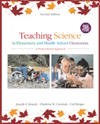 |  Teaching Children Science: A Project-Based Approach, 2/e Joe Krajcik,
University of Michigan - Ann Arbor
Charlene Czerniak,
University of Toledo
Carl Berger,
University of Michigan - Ann Arbor
Why Do We Assess Students in Science?
Definitions| assessment | Any method used to judge or evaluate an outcome or help make a decision.
|  |  |  | | authentic assessment | Measures meaningful understanding by stressing open-ended answers rather than a single "correct" one.
|  |  |  | | classroom assessments | Assessment used to help teachers evaluate students' progress during a unit of study.
|  |  |  | | content knowledge | The central concepts, principles, and theories in an area of study.
|  |  |  | | embedded | Lodged in instruction.
|  |  |  | | feedback | Comments to provide useful information.
|  |  |  | | formative assessments | Day-to-day assessments used to help teachers evaluate students' progress during a unit of study and make decisions regarding curriculum and instruction.
|  |  |  | | large-scale assessment | District, state, or national assessments used to evaluate school curriculum, school district progress, and programs; sometimes called high-stakes assessment because of the importance placed on the tests.
|  |  |  | | metacognitive knowledge | Self knowledge or knowledge of one's own cognition.
|  |  |  | | procedural knowledge | Knowledge allows people to know how to do something, conduct inquiry, or use a skill.
|  |  |  | | reflective practitioners | Teachers who think about, analyze, and mentally debate what should be done to most effectively teach particular students at any given moment.
|  |  |  | | reliable assessment | Assessment that provides consistent results across different trials, thus yielding similar results on different occasions.
|  |  |  | | summative assessment | Assessment of individual achievement in the form of end-of-unit tests, letter grades, and large-scale assessments.
|  |  |  | | valid assessment | Assessment that is fair and allows the teacher to make accurate generalizations about a student's knowledge.
|
|



 2003 McGraw-Hill Higher Education
2003 McGraw-Hill Higher Education